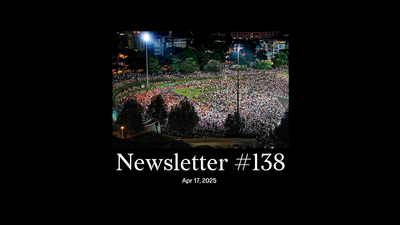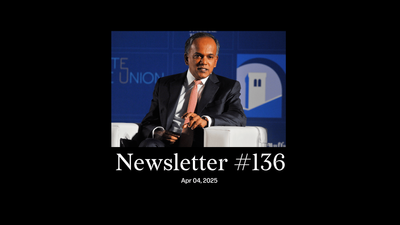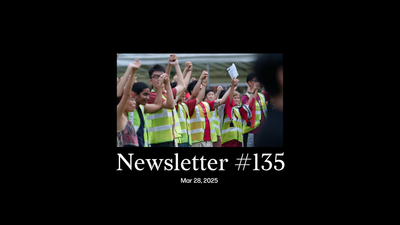Dear reader,
First, in last week’s newsletter, there was a wrong link and a wrong translation: siu ngoh is Cantonese for roast goose, not duck. Apologies—and thanks to all who wrote to me to point them out. Jom is eight months old, and we’re getting there, with your help. (Note to self: never let a vegetarian colleague translate the name of a meat dish.)
In terms of the worry about making mistakes, today Jom writes about legal issues, an area that scares off many commentators in this country. There are historical reasons for this, including the People’s Action Party’s long-standing sensitivity to any criticism of the courts.
That’s a shame. Though commenting on ongoing cases is tricky, because of the potential of contempt of court, the ability to fairly criticise law-making, judicial decisions, or other aspects of the criminal justice system, is a hallmark of any vibrant democratic society.
Media channels should be doing so in a more deliberate fashion in order to provoke thought amongst people. But they’re not.
Consider the recently concluded case of the Public Prosecutor versus Karl Liew. He’s the son of Liew Mun Leong, the disgraced Temasek executive whose family’s abject treatment of Parti Liyani, an Indonesian domestic worker, exposed the horrific classism and exploitation that exist in society.
The judge sentenced Liew to two weeks in jail, more than both the prosecution and defence had wanted (just a fine). But the most shocking line in the brave judge’s Oral Grounds was that the prosecution’s submissions “read like a mitigation and were lifted wholesale and repeated for effect by the defence in its own Mitigation & Submissions on Sentence.”
Imagine that: in a case involving the son of a pillar of Singapore Inc, the state prosecutor appeared to be doing the defence’s job. Yet in their reporting none of the three main mainstream media channels—CNA, The Straits Times, TODAY—mentioned the judge’s comment, despite the buzz online about it. And so it was left to the usual suspects—Kirsten Han and TOC—to play their vital public information role.
There are also technical reasons, of course, why writers shy away from legal issues. Who has the time and skill to parse through all that legalese? It’s quite intimidating. And so, two weeks ago when the judgement was released, I messaged Daryl Yang, a lawyer who’s already written one piece for Jom on Singapore’s workplace discrimination law.
Daryl suggested Carol Yuen, another lawyer whom I’d bumped into a couple of times. I’m glad Carol agreed. In “Karl Liew: the case against the prosecution”, her first piece for Jom, we learn so much not just about the role of the public prosecutor and the way cases are prosecuted, but also about all the peculiarities surrounding this particular case.
Following a string of cases involving powerful people, most recently a bunch of (allegedly) corrupt Keppel Offshore & Marine executives, many Singaporeans are concerned by the suggestion that not all are equal in the eyes of the law. Carol ends her piece with recommendations on how we can boost confidence in the overall criminal justice system.
The editorial back and forth with Carol this week was fun, similar to my interactions with academics. I was trying to break up long sentences and use journalistic shorthand; and, pushing back, Carol was pointing out where I had unwittingly sacrificed nuance and meaning.
I hope the final piece is readable and rigorous. Do read and reply to let me know, all part of our collective effort to improve writing on legal issues in Singapore.
More importantly, perhaps, Carol reminds us of the abuse and injustices the most vulnerable people in this society have to contend with. In her victim impact statement—which the prosecution, surprise surprise, ignored—Parti talked about her financial, social and reputational losses.
“I come from a poor family and have been independent since very young. For every (payment of) salary that I received, I would remit part of it to my mother and siblings in Indonesia,” she said. “When I did not earn any income, this had definitely impacted my mother every day for four years.”
It’s all so terribly sad.
Jom nangis,
Sudhir Vadaketh
Editor-in-chief, Jom
If you've enjoyed our newsletters, please scroll to the bottom of this page to sign up to receive them direct in your inbox.






